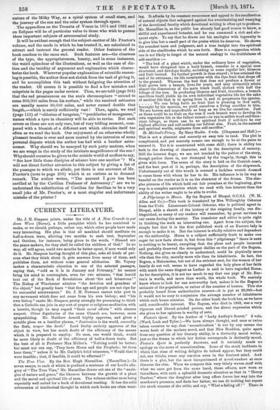from the Urdri. Lieutenant-Colonel Osborne, who is political agent in
Bhopal, adds a sketch of the history of the reigning family, one dis- tinguished, as many of our readers will remember, by groat services to our cause during the mutiny. The translator and editor is quite right in thinking the work an interesting one. Apart from tho subject, the simple fact that it is the first published work of an Eastern lady is enough to make it so. But the interest is wholly relative and dependent on the authorship. Mecca is a subject sufficiently fresh to make one eager for now facts about it, but from this " pilgrimage " there is next to nothing to be learnt, excepting that the place and people incurred and probably deserved the strongest dislike on the part of the Begam. Nothing, she gives us clearly to understand, could be physically more vile than the city, morally more vile than its inhabitants. In fact, the Begum, a Mahometan, but not of the strictest sect, for the women of her family do not veil, seems to have regarded the holy place of her faith with much the same disgust as Lather is said to have regarded Rome.
As for description, it is not too much to say that one page of Mr. Bar- ton's is worth, and more than worth, the whole book. We scarcely know where to look for one noteworthy fact, unless it be the Begum's estimate of the population, or rather of the number of houses. This she probably hoard from authoritative sources—it is put at 20,000—but it would not be easy to conjecture the average number of inhabitants which each house contains. On the other hand, the book has, as we have said, considerable interest. The Begnm, who died in 1868, was a very vigorous and liberal•minded person, and the direct expression which she gives to her opinions is worthy of note.


































 Previous page
Previous page